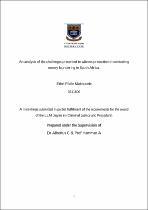An analysis of the challenges presented to witness protection in combating money laundering in South Africa
Abstract
The United Nations Asia and Far East Institute (‘UNAFEI’) and the Department of Justice of the Republic of the Philippines held the Fourth Regional Seminar on Good Governance For South East Asian Countries from 6-9 December 2010.1 During that seminar, Haruhiko Ukawa, the Deputy Director of UNAFEI, stated in his introductory remarks that to detect, investigate, and prosecute illegal activities and find offenders guilty, the criminal justice systems depend largely on witnesses’ testimony. Consequently, it is important for witnesses to testify without fear to ensure the criminal justice system operates properly and achieves their goals.2 At the outset, however, it ought to be borne in mind that with many financial crimes, more particularly the crime of money laundering, witnesses are often reluctant to testify. The prosecution for such crimes is thus not easily achieved, and conviction rates may be negatively affected.

